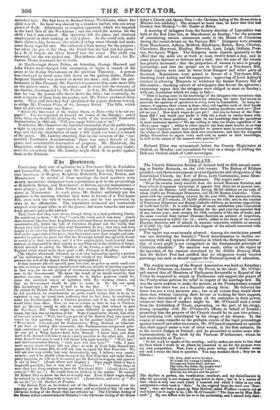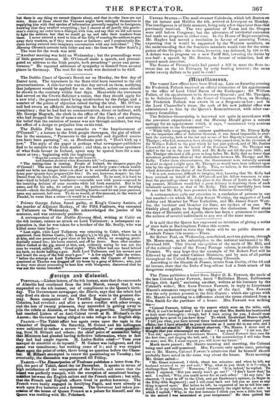IRELAND.
The Church Education Society of Ireland held its fifth annual meet- ing, at Dublin Rotunda, on the 11th instant. The Bishop of Kildare presided ; and there were present several dignitaries and clergymen of the Established Church, the Earl of Enie, Lord Castlemaine, some Mem- bers of Parliament, and other gentlemen. The report said-
" From the returns lately received from the several Diocesan Societies, and from schools in separate connexion, it appears that there are at present con- nected with the Society, 1,647 schools, having 99,165 children on the rolls, of whom 13,895 are Protestant Dissenters, and 32,788 Roman Catholics. Com- pared with the corresponding returns for the year 1842, this statement shows an increase of 275 schools, of 13,063 children on the rolls, and in the nambei of Protestant Dissenters and Roman Catholic children, an increase respectively of 5,530 and 3,176. It is with feelings of much satisfaction your Committee announce that the income of the Society for the past year has exceeded that of any former year ; your receipts for 1843, exclusive of the sale of books, and the sums received from various Diocesan Societies on account of inspection,, having amounted to 2,005/. 13s. 7d. ; which, added to the funds of the several Diocesan Societies, and of schools in separate connexion, exhibits an amount of 27,392/. 13s. 5id. contributed to the support of the schools connected with your Society." The report was unanimously adopted. Among the resolutions passed was one declaring the Society's "fixed determination to decline co- operating with any system of education in which the Scriptural instruc- tion of every pupil is not recognized as the fundamental principle of Christian education." No mention was made, either in the report or the speeches, of the rumour circulated by the Dublin Evening Mail, that Sir Robert Peel had notified that no clergymen would receive patronage but such as should support the National system of education.
The weekly meeting of the Repeal Association was held on Saturday; Mr. John Primrose, ex-Justice of the Peace, in the chair. Mr. O'Con- nell moved that all Members of Parliament favourable to Repeal of the Union be requested to attend in Parliament and support the prayer of the Presbyterian petition for relief in respect of the marriage-law. He was the more anxious to make the motion, as the Presbyterians seemed to boast that there was not a Repealer among them. He believed the boast was not a very accurate one ; but at all events they would show them that, without currying their favour or looking for their support they were determined to give them all the assistance in their power, whatever their line of conduct might be. Mr. O'Connell read a letter from the Archbishop of Tuam, expressing, on the part of his clergy, strong sympathy with Mr. O'Connell's efforts in behalf of Ireland ; promising him the prayers of the Church should he be cast into prison; and enclosing 1151. contributed by the clergy of his diocese. In the course of some remarks on the probable course of the legal proceediagi against himself and other traversers, Mr. O'Connell expressed an opinion that their appeal under a writ of error would, in the first instance, lie to the twelve Judges in Ireland; and he proceeded to notice some mis- representations in the book by the Viscount D'Arlincourt, whom he met accidentally at Tara- " In his work be speaks of the meeting; and he makes me state to him that six lines which I wrote in an album he presented to me for the purpose were my own composition. Now, / am a plain prow writer, and I neither wrote nor said I wrote the lines in question. You may recollect them ; they are as follows—
'Oh, Erin, shall it e'er be mit,.
To wreak thy wit:attain haute-line; Torahs's-my victor head. and see Thy hills, thy dales, iby people tees? That glance of bliss is all I crave Between my labours and the grave.'
The rhythm is perfect, the versification excellent, and my disinclination to take the paternity is not because of any defect in them • but it is a matter g fact : there is only one word which I inserted and which I claim as my owe composition—that word is Erin.' In the original lines the word was Scot. land : they are from a poem by Miss Mitford, called Wallace—a poem not ati well known as it ought to be. [Mr. M. O'Connell: "The lines are by Miss Rol- croft."] My son differs with me as to the authorship, and I cannot help that.: but there is one thing we cannot dispute about, and that is—the lines are not mine. Some of those about the Viscount might have indulged themselves in supplying him with that species of information generally supplied to foreigners, knowing that they swallow everything ; but I cannot at all justify this gentle- man's making me enter into a dialogue with him, and say that we did not mean to fight the soldiers, but that we would go up and take their muskets from them. I never uttered a word to him of the folly of coaxing the soldiers to give away their muskets, as if they were straw or feathers ; and I emphatically dis- claim having entered into imaginary conversation with any individual." [The Morning Chronicle corrects both father and son : the lines are Walter Scott's.] The rent for the week was 403/.
—Another meeting was held on Wednesday; but the proceedings were of little general interest. Mr. O'Conuell made a speech, and promul- gated an address to the Irish people, both preaching" peace and perse- verance." He reported addresses of sympathy to hinaself frorn several places in Germany. The rent for the week was declared to be 6201.
The Dublin Court of Queen's Bench sat on Monday, the first day of Easter term. The traversers in the State trial have resorted to the old procrastinations. A side-bar rule was that day served on them, notifying that judgment would be applied for on the verdict, unless cause should be shown to the contrary within four days. Meanwhile the traversers had served on the Crown-Solicitor a notice, that they should apply for a new trial ; the grounds stated being misdirection by the Judge, and a number of the points of objection raised during the trial. Mr. O'Con- nell had sworn an affidavit declaring that be had not entered into any conspiracy ; that he had had no communication, direct or indirect, with Mr. George Magrath, the clerk in the office of the Clerk of the Peace, who had dropped the list of names out of the Jury-lists ; and asserting his belief that the omission of names was not through accident, but was the effect of a design to prejudice him on his trial.
The Dublin Pilot has some remarks on " the Imprisonment of O'Connell"; a lecture to the Irish people thereupon, the gist of which lies in the sentence, " Persevere in the peaceful and dignified course you have been pursuing," or, as Bombastes puts it, " Don't kick up a row." The style of the paper is perhaps what newspaper-publishers find to be suitable to the Irish market ; and thus, as a curious specimen of what finds favour in Ireland, space may be spared here for a sen- tence or two ; beginning with the beginning.
" Hope for a season bade the world farewell.
And freedom shrieked when Kosciusko fell."—CAstrestm
"The testing-time is coming. People of Ireland, the dungeon gapes for O'Connell! The man that battled for you five and forty years—whom wealth could not bribe nor danger deter—is about to be entombed alive in the charnel- house your tyrants have prepared for him ! Da not, however, despair: he, like Daniel from the lion's den, will come out unscathed. To be sure, it is hard to bear—hard to behold your benefactor—venerable now with years—exposed to the insulting derision of your enemies while led forth manacled. But in his name, and for his sake, we exhort you : Be patient—hold in your bursting breath—check the throbbing of your swelling hearts—and let not your passions, upon any account, boil over. To do so would, at this moment, in the words of Fouche, be worse than a crime—it would be a blunder!
- Private George Jubee, found guilty, at King's County Assizes, of the murder el Adjutant Mackey, of the Fifth Fusileers, was executed at Tallantore on Wednesday. He acknowledged the justice of his sentence, and was extremely penitent.
A correspondent of the Dublin Evening Mail, writing at Cahir on the 8th instant, relates an attack on Lord Tullamore: a subsequent ex- planation is, that he was taken for a brother of the Mr. Scully, who was killed some time back— Last night, while Lord Tullamore was returning to Cahir, where he is quartered, from Brittas Castle, (Mr. Langley's,) in his gig, two fellows rushed at him, and one presented a gun close at his head, which, on snapping, provi- dentially missed fire; his horse started, and off he drove. Soon after another fellow rushed at the gig, stared at him, and, evidently seeing he was not the man he wanted, sulkily said, 'Good night.' This fellow had one hand behind his back, no doubt holding a gun. Both Lord Tullamore and his servant saw and heard the snap of the first man's gun." "A few nights," adds the writer, "before the attempt on Lord Tullamore was made, the Captain of Infantry quartered at Tharles was dragged off his horse by a gang of fellows; who, just as they were about proceeding to beat him with bludgeons, discovered that he was not the victim intended."



























 Previous page
Previous page